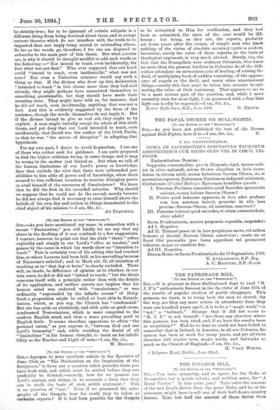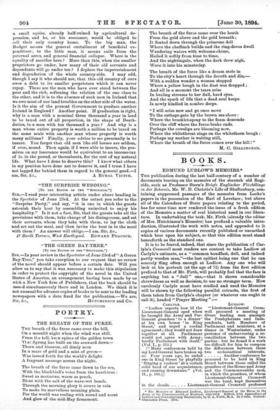THE FINANCE BILL.
[To THE EDITOR OF THE " SPECTATOR." ] SIR,—You have sympathy, and to spare, for the Duke of Devonshire, but a gentle rebuke, and nothing more, for "A Rural Victim." Is this quite j net? Take twice the amount of the new Death-duties from the great Duke, and he, or his successor, might have to sell one of their half-dozen country houses. Take but half the amount of those duties from a small squire, already half-rained by agricultural de- pression, and he, or his successor, would be obliged to sell their only country home. To the big man, the Budget means the general curtailment of beneficial ex- penditure ; to the little man, it means exile from the paternal acres, and general financial collapse. Where is the equality of sacrifice here P More than this, when the smaller proprietors go under, how many of their old servants and dependents will go under too P I deplore the impoverishment and degradation of the whole country-side. I may add, though I say it who should not, that this old country of ours owes a debt to its smaller proprietors which it can never repay. These are the men who have ever stood between the poor and the rich, softening the relation of the one class to the other, and it is to the absence of such men in Ireland that we owe most of our land troubles on the other side of the water. Is it the aim of the present Government to produce another Ireland in England P Another point. If graduation is right, why is a man with a nominal three thousand a year in land to be taxed out of all proportion, in the shape of Death- duties, to a man with ten thousand a year P And why is a man whose entire property is worth a million to be taxed on the same scale with another man whose property is worth many millions ? Finally, your advice to me personally is to insure. You forget that old men like old horses are seldom, if ever, sound. Then again, if I were able to insure, the pre- mium on my insurance would be equivalent to an income-tax of 2s. in the pound, or thereabouts, for the rest of my natural life. What have I done to deserve this? I know what others in my position have done not to deserve it, and I trust I have not lagged far behind them in regard to the general good.—I



















































 Previous page
Previous page